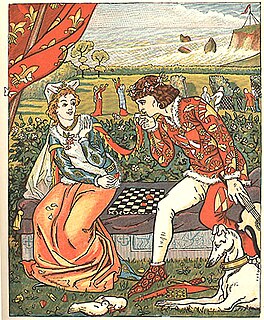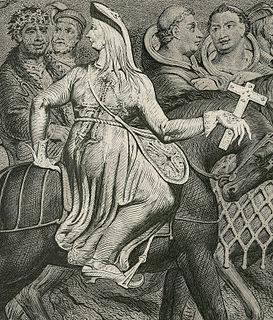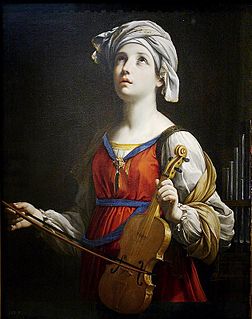
The Canterbury Tales is a collection of twenty-four stories that runs to over 17,000 lines written in Middle English by Geoffrey Chaucer between 1387 and 1400. It is widely regarded as Chaucer's magnum opus. The tales are presented as part of a story-telling contest by a group of pilgrims as they travel together from London to Canterbury to visit the shrine of Saint Thomas Becket at Canterbury Cathedral. The prize for this contest is a free meal at the Tabard Inn at Southwark on their return.

Geoffrey Chaucer was an English poet, author, and civil servant best known for The Canterbury Tales. He has been called the "father of English literature", or, alternatively, the "father of English poetry". He was the first writer to be buried in what has since come to be called Poets' Corner, in Westminster Abbey. Chaucer also gained fame as a philosopher and astronomer, composing the scientific A Treatise on the Astrolabe for his 10-year-old son Lewis. He maintained a career in the civil service as a bureaucrat, courtier, diplomat, and member of parliament.

"The Knight's Tale" is the first tale from Geoffrey Chaucer's The Canterbury Tales.

"The Miller's Tale" is the second of Geoffrey Chaucer's Canterbury Tales (1380s–1390s), told by the drunken miller Robin to "quite" "The Knight's Tale". The Miller's Prologue is the first "quite" that occurs in the tales.

"The Wife of Bath's Tale" is among the best-known of Geoffrey Chaucer's Canterbury Tales. It provides insight into the role of women in the Late Middle Ages and was probably of interest to Chaucer himself, for the character is one of his most developed ones, with her Prologue twice as long as her Tale. He also goes so far as to describe two sets of clothing for her in his General Prologue. She holds her own among the bickering pilgrims, and evidence in the manuscripts suggests that although she was first assigned a different, plainer tale—perhaps the one told by the Shipman—she received her present tale as her significance increased. She calls herself both Alyson and Alys in the prologue, but to confuse matters these are also the names of her 'gossib', whom she mentions several times, as well as many female characters throughout The Canterbury Tales.

"The Franklin's Tale" is one of The Canterbury Tales by Geoffrey Chaucer. It focuses on issues of providence, truth, generosity and gentillesse in human relationships.

"The Pardoner's Tale" is one of The Canterbury Tales by Geoffrey Chaucer. In the order of the Tales, it comes after The Physician's Tale and before The Shipman's Tale; it is prompted by the Host's desire to hear something positive after the physician's depressing tale. The Pardoner initiates his Prologue—briefly accounting his methods of swindling people—and then proceeds to tell a moral tale.
The Hengwrt Chaucer manuscript is an early-15th-century manuscript of the Canterbury Tales, held in the National Library of Wales, in Aberystwyth. It is an important source for Chaucer's text, and was possibly written by someone with access to an original authorial holograph, now lost.

"The Man of Law's Tale" is the fifth of the Canterbury Tales by Geoffrey Chaucer, written around 1387. John Gower's "Tale of Constance" in Confessio Amantis tells the same story and may have been a source for Chaucer. Nicholas Trivet's Les chronicles was a source for both authors.

Sir Thopas is one of The Canterbury Tales by Geoffrey Chaucer, published in 1387. The tale is one of two—together with The Tale of Melibee—told by the fictive Geoffrey Chaucer as he travels with the pilgrims on the journey to Canterbury Cathedral. The tale concerns the adventures of the knight "Sir Thopas" and his quest to win the elf-queen.

The General Prologue is the first part of The Canterbury Tales by Geoffrey Chaucer. It introduces the frame story, in which a group of pilgrims travelling to the shrine of Thomas Becket in Canterbury agree to take part in a storytelling competition, and describes the pilgrims themselves.

"The Squire's Tale" is a tale in Geoffrey Chaucer's The Canterbury Tales. It is unfinished, perhaps deliberately, and comes first in group F, followed by the Franklin's interruption, prologue and tale. The Squire is the Knight's son, a novice warrior and lover with more enthusiasm than experience. His tale is an epic romance, which, if completed, would probably have been longer than rest of the Tales combined. It contains many literary allusions and a great deal of vivid description.

"The Second Nun's Tale", written in late Middle English, is part of Geoffrey Chaucer's The Canterbury Tales. Narrated by a nun who remains unnamed, it is a hagiography of the life of Saint Cecilia.

"The Monk's Tale" is one of The Canterbury Tales by Geoffrey Chaucer.
The Legend of Good Women is a poem in the form of a dream vision by Geoffrey Chaucer during the fourteenth century.

Contact between Geoffrey Chaucer and the Italian humanists Petrarch or Boccaccio has been proposed by scholars for centuries. More recent scholarship tends to discount these earlier speculations because of lack of evidence. As Leonard Koff remarks, the story of their meeting is "a 'tydying' worthy of Chaucer himself".
Sigmund Eisner (1920–2012) was an American scholar of medieval literature. A professor emeritus at the University of Arizona, he was a noted expert on Geoffrey Chaucer and was frequently consulted on matters of astronomy in Chaucer.
Emeritus Professor Phyllis Hodgson (1909–2000) was a Medievalist and translator of medieval texts.

Gillian Lesley "Jill" Mann, FBA, is a scholar known for her work on medieval literature, especially on Middle English and Medieval Latin.
Norman Francis Blake was a British academic and scholar specialising in Middle English and Early Modern English language and literature on which he published abundantly during his career.















